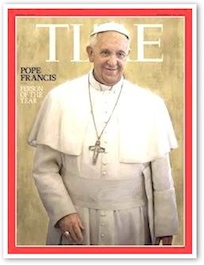A man of the year, but a Church for all time
- FATHER RAYMOND J. DE SOUZA
Time magazine used to be delivered to our home when I was a boy, one way my parents provided for our broader education.
 |
Then it seemed I only saw it in waiting rooms. And then I never saw it anywhere, and thought it had gone bellyup and become a website. Turned out that was Newsweek, and Time is still here and performing the annual service of anointing a "person of the year." This year it is Pope Francis.
I suppose it is an "honour," though given that the 10 finalists selected by Time's editors included Miley Cyrus and Kathleen Sebelius, that term only tenuously holds. In any case, once upon a time — say, back in 1994 when Time chose John Paul II, or in 1962, when it chose John XXIII — perhaps it mattered, but now it is interesting only as a measure of secular reaction to the brand new pope.
Not that Time is being premature. It took the Nobel committee 263 days from Barack Obama's inauguration to award him the Peace Prize. The person of the year designation landed on Francis after a mature consideration of a full 274 days. Given that most people at Time had never heard of Jorge Mario Bergoglio when he was elected on March 13, what is it that has so fascinated them in less than a year?
The answer given in the rather eloquent cover story is that, "in a matter of months, Francis has elevated the healing mission of the church — the church as servant and comforter of hurting people in an often harsh world — above the doctrinal police work so important to his recent predecessors."
There is some nonsense in that — Time forgets John Paul being the first world leader to physically embrace AIDS patients, or visiting prison to forgive his would-be assassin — but some sense, too. Benedict XVI taught in his first encyclical that, "the Church's deepest nature is expressed in her three-fold responsibility: of proclaiming the word of God (kerygma-martyria), celebrating the sacraments (leitourgia) and exercising the ministry of charity (diakonia). These duties presuppose each other and are inseparable. For the Church, charity is not a kind of welfare activity which could equally well be left to others, but it is a part of her nature, an indispensable expression of her very being."
The Church, like the prophets of old, is often not popular when proclaiming God's word, which always challenges the errors of the time. She can seem mysterious, even alien, in her liturgy and rituals. Consequently she is, and has always been, most attractive when manifesting the healing, merciful love God has for every person, especially the suffering and the afflicted.
The Church, like the prophets of old, is often not popular when proclaiming God's word, which always challenges the errors of the time. |
And that is largely what the Church does in history. Look at her great saints and founders. The vast majority were outstanding in the corporal works of mercy — feeding the hungry, clothing the naked, healing the sick, educating the ignorant, visiting the imprisoned. Relatively few were engaged in "doctrinal police work," which is a pejorative way of saying teaching the truth about God and His revelation.
The 20th century posed three enormous challenges, not only to the Church, but to all of Western civilization. The first was from "above," the totalitarian state seeking to crush all social institutions, including marriage, family and the church. The second was from "below," the sexual revolution and its attendant social changes, which undermined marriage, family and the church. The third was in the entire intellectual environment, in which the possibility of knowing the truth at all, especially moral truth, was radically questioned.
It is possible to understand John Paul II and Benedict XVI as two parts of an epic, world-changing, 35-year pontificate, which went into battle on all three fronts. Call it "police work" or manning the barricades or clambering aboard the ark in rough waters — it was necessary. If Francis now is able to return to what the Church usually does in times of relative tranquility, it is because of what went before. Does the Church appear to be more attractive under Francis? Time is right about that, for she is attempting to be more of who she properly is.
A final note to "person of the year." The 10 finalists did not include Vladimir Putin who, from Ukraine to Syria and Iran, was not only the biggest news maker of the year, but saw his international influence at its zenith. Francis is a more encouraging choice than Putin, but history is not always encouraging.
 This is Meaghen Gonzalez, Editor of CERC. I hope you appreciated this piece. We curate these articles especially for believers like you.
This is Meaghen Gonzalez, Editor of CERC. I hope you appreciated this piece. We curate these articles especially for believers like you.
Please show your appreciation by making a $3 donation. CERC is entirely reader supported.

Acknowledgement
Father Raymond J. de Souza, "A man of the year, but a Church for all time." National Post, (Canada) December 19, 2013.
Reprinted with permission of the National Post and Fr. de Souza.
The Author
Father Raymond J. de Souza is the founding editor of Convivium magazine.
Copyright © 2013 National Post



